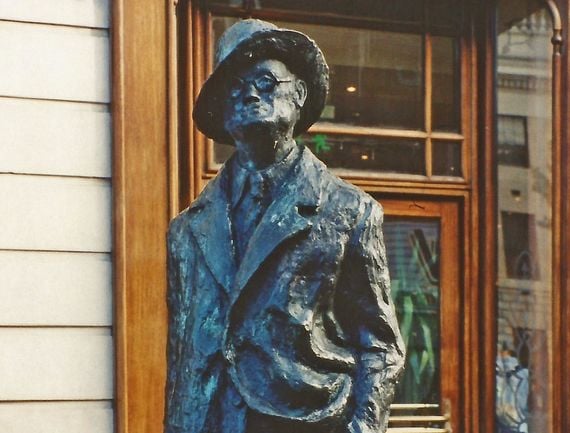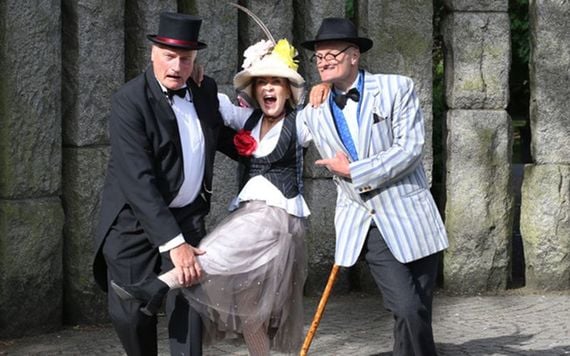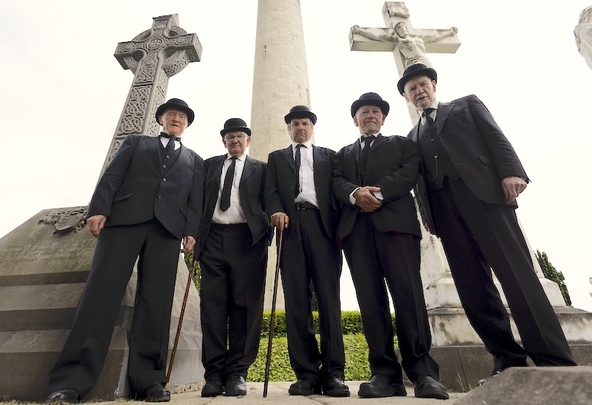Every year on June 16, I wish family and friends a Happy Bloomsday. Often, I am met with bemusement and looks of bewilderment. So, I think I should explain what exactly Bloomsday is and why it matters.
June 16 is the day that the Irish author James Joyce set his landmark novel "Ulysses". It has become, especially in Dublin, a celebration of all things related to Joyce. The short answer to our question is that Bloomsday matters because "Ulysses" matters.
Unfortunately, "Ulysses" is seen as a great novel but one that is not for ordinary readers. Nothing could be further from the truth.
Joyce does not lead you by the hand through the novel. You certainly must pay attention as you are reading "Ulysses", but it is something that the ordinary reader can grasp.
At its core, "Ulysses" is a portrait of June 16, 1904, as it was experienced by two very different men, Stephen Daedalus and Leopold Bloom. In a very basic sense, nothing extraordinary happens in "Ulysses". It is a record of the ordinariness of life. Joyce brilliantly captures what it was like to be living and working in Dublin in June of 1904.

A statue of James Joyce on North Earl Street in Dublin.
Why "Ulysses" matter?
"Ulysses" matters because it provides us with an amazingly detailed portrait of the people, places, and even smells of Dublin in 1904. Joyce is said to have said that if Dublin was destroyed, it could be rebuilt from the depictions in "Ulysses". Even today, a hundred-plus years after the fact, you will see businesses from pubs to funeral homes try to promote themselves by pointing out that they were mentioned in "Ulysses".
If you are familiar with "Ulysses", these references are superfluous because you know that if it was around in Dublin in 1904, Joyce mentioned it in "Ulysses".
Read more
Though nothing momentous happens in Ulysses, Joyce models his book on the structure of Homer’s "Odyssey". The eighteen chapters of "Ulysses" have parallels with the "Odyssey". Understanding this structure adds a deeper dimension to your reading of "Ulysses". By modelling the story of his novel of one day in Dublin on a the great Homeric epic, Joyce is saying in a beautiful way that each of our days, no matter how mundane and boring they seem to be, are heroic.
While the style Joyce uses changes with every chapter, Joyce pioneers the stream of consciousness style. Though it can be hard to follow at times, through this technique, Joyce allows us to enter the heads of Leopold Bloom and Stephen Dedalus so we know not only what they are doing, but we know what they are thinking. Like most of us, Bloom and Stephen’s thoughts are often random and disorganized. They are, most importantly, quintessentially human.

Celbrating in style on Bloomsday.
Leopold Bloom
"Ulysses" matters in large part because it has one of the most remarkable characters in literature: Leopold Bloom. In many ways, Bloom is a perfect character for our unsettled times. Bloom is an outsider in his world. He is a non-practicing Jew in a Catholic country and a child of immigrants in a place where immigrants are few and far between.
While Bloom is the central character of "Ulysses", he is far from heroic. He knows that his wife is having an affair but he does nothing to stop it; he spies on two young girls at the beach and he is conducting an illicit letter-writing campaign with another woman. Despite all of this, there is something about Bloom that wants you to root for him. There is a basic goodness to Bloom. We watch him handle antisemitic abuse with grace and resolve and we see him offer comfort – and a cup of hot cocoa – to a drunken and worse for the wear Stephen Daedalus who rebuffs his friendship.
So, in the final analysis, Bloomsday matters as it is the setting for what might be the greatest novel ever written. "Ulysses" is great because it reminds us that our ordinary days are heroic epics and that most of us are like Leopold Bloom, very flawed and imperfect but basically good people.
This article was submitted to the IrishCentral contributors network by a member of the global Irish community. To become an IrishCentral contributor click here.




Comments